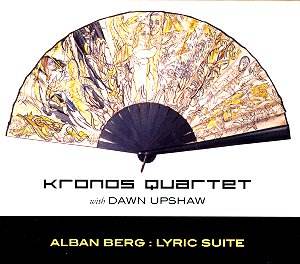This is one of a small,
enterprising group of CD singles from
Nonesuch. Of course there is no shortage
of Lyric Suites in the catalogue,
but the real reason for this release
is pretty obvious from the title above,
where we have the addition of a soprano
to the usual string quartet.
I well remember the
intense interest surrounding leading
Berg authority George Perle’s discovery
of an annotated score of the Lyric Suite
around 1977. In a subsequent BBC documentary
entitled ‘The Secret Life of Alban Berg’
(which I still have on video) he elucidated
the real value of this discovery. Berg
had always intended his finale to have
a vocal dimension, but had decided to
suppress it on the grounds that it aped
rather too closely his teacher Schoenberg’s
Second String Quartet, with its two
vocal movements ‘Litany’ and ‘Transport’.
These are both settings of poems by
Stephan George. Berg had also intended
to use George’s work, in fact his translation
of Baudelaire’s ‘De profundis clamavi’.
One can understand Berg’s reluctance
to be too closely compared to his idol,
but Perle’s annotated score revealed
a whole new reason for the suppression.
The score is littered throughout with
secret encodings (alphabetical and numerical)
of his love for Hanna Fuchs-Robettin,
wife of a wealthy Prague industrialist
and supporter of Berg. The affair was
apparently unconsummated, and this secretly
annotated score was the first real evidence
of Berg’s true feelings. It was only
a matter of time before a recording
was made, and it has been worth the
wait.
I suppose we have to
examine the Kronos’s performance of
the first five movements before tackling
the ‘new’ bit, and they certainly throw
themselves into the tortured world of
Bergian angst with customary zeal. The
opening Allegretto gioviale is
jovial in a typically intense, Viennese
fin-de-siècle way, with
those scrunching harmonies and hints
of Mahlerian march rhythms clearly and
concisely articulated. In fact, overall
this playing is phenomenally accurate,
if a little on the cool side. The second
movement’s amoroso marking is
not as keenly felt as in the famous
reading by the eponymous Alban Berg
Quartet (EMI), but the delicious hints
of Viennese waltz are beautifully pointed
without being over-obvious. The next
three movements, marked with increasing
feverishness by Berg Allegro misterioso,
Adagio appassionato and Presto
delirando, show the Kronos to be
on the top of their form. The percussive
nature of the fifth movement particularly
suits their talents, and emerges sounding
amazingly close to Bartók.
The work’s finale reaches
new heights of desperation and is marked,
appropriately enough, Largo desolato.
There is no question that when the soprano
enter (around 1’15) the parallel with
Schoenberg is unmistakable. Throughout
the piece Berg scholars have found text
links with Zemlinsky’s Lyric Symphony
(from which Berg gets his title) but
when the Baudelaire words are sung above
the tense, chromatic harmonies, the
composer’s true feelings are fully revealed.
The famous Tristan chord quote
(2’56) has always intrigued me, but
the words that now accompany it tell
the true story. ‘There is not even a
stream, nor a tree, neither field nor
flock’ intones the soprano, and this
could be a virtual quotation from Act
3 of Wagner’s opera, where the feverish,
wounded Tristan lies in a state of near-death
on a barren Cornwall landscape. Though
this was not meant for public consumption,
when we do experience it the emotional
state of Berg’s mind becomes all too
clear. The text also helps to make the
closing bars (already pretty intense)
become almost unbearable; ‘…so slowly
does the spindle of time unwind…’ she
sings, before dying away, followed by
each instrument, in turn, giving way
to silence…
This will be a mandatory
purchase for Bergians or lovers of this
sort of repertoire. It almost renders
comparison with existing versions unnecessary,
though you shouldn’t ditch your favourites.
It could be argued that Nonesuch should
have perhaps recorded an ‘ordinary’
finale, banded it separately, and given
the listener the choice. Whatever, I
doubt I shall be able to listen to this
great and enigmatic work again without
reference to this new finale, which
unlocks so many of the piece’s secrets.
Tony Haywood
